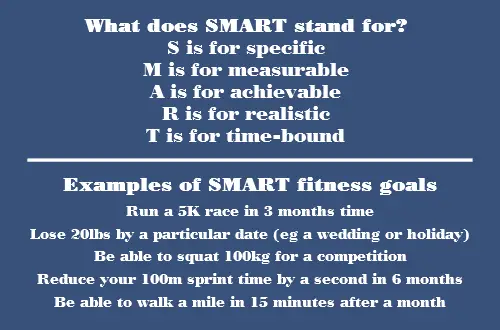If you’ve ever had a fitness assessment at a gym or with a personal trainer, chances are they’ve told you how important it is for you to have SMART goals. On the other hand, if you’ve turned up for a group exercise class, the instructor will probably have welcomed you into the class without grilling you on what specifically your objectives are and how you will know when you have achieved them. Likewise, public health initiatives just encourage us to get active any way we can, not to set out defined goals. This post looks at what SMART goals are – including some SMART fitness goals examples – and when it’s helpful to use them.
SMART fitness goals examples

SMART goals are widely used, both in sport and fitness training and elsewhere. As the popularity of the acronym has grown, so has the number of alternatives the letters stand for! The following is the original version that has been around for years, but you may come across variations on this:
S is for specific: You should clearly define your goals.
M is for measurable: The goal must contain a measurable quantity, such as body weight, girth measurement, distance, weight lifted etc.
A is for achievable: The goal has to take into account the physical limitations of the person. Most people are never going to run a 4 minute mile, however hard they train, for example.
R is for realistic: Similar to achievable but more concerned with how you are going to do it, rather than whether it is theoretically possible. So for example you may have the physical potential to run a 4 minute mile but if you only have 30 minutes a week to train, then this goal isn’t realistic.
T is for time-bound: The goal should have a specific date by which you will achieve it.
Examples of smart fitness goals include:
- Run a 5K race in 3 months time
- Lose 20lbs by a particular date (eg a wedding or holiday)
- Be able to squat 100kg for a competition
- Reduce your 100m sprint time by a second in 6 months
- Be able to walk a mile in 15 minutes after a month
All of the above are Specific, Measurable and Time-bound. Whether or not they are Achievable and Realistic would depend on the individual person.
So do we always need SMART goals?
SMART goals do have their place in sport and fitness of course. Sports professionals have to work very rigidly to goals and anyone who is training for competition or who has a specific objective in mind could benefit from them. For example, if you want to go from beginner to running a marathon, you would need to set some defined goals and have a clear training program. But if you’re currently inactive and/or overweight and just want to improve, the first step should be to establish better habits.
It’s OK to just want to be “fitter”

The most common reasons people start a fitness program are to:
- Lose weight
- Improve body definition
- Be more healthy
- Have more energy
People often sum this up by saying they want to “be a bit fitter”. There is nothing wrong with this. They don’t need someone telling them that this isn’t a proper goal and that they should define what they mean by “fitter”, how they are going to measure “fitter” and when they want to be “fitter” by.
The same goes for weight control. If a person is overweight, the first step should be to establish long term healthy eating habits, not to set a target of losing x number of pounds in y number of weeks. Losing weight can be difficult and unpredictable and lasting weight loss is usually a slow process. Setting goals can be counter-productive because it adds pressure and can make the person feel she is failing if she doesn’t achieve them. A better initial approach would be to assess the current diet and identify some healthy changes to make to it.
So are SMART fitness goals right for you?
In summary, SMART goals will be helpful to you if you:
- Want to train for something very specific
- Like to challenge yourself
- Prefer to be self-disciplined and work to targets
They may not be helpful if you:
- Just want a more active lifestyle
- Aren’t sure what you want to achieve
- Are a beginner and don’t know what you’re capable of
- Feel that you want to ease yourself into starting a fitness program (you can always set goals later)
